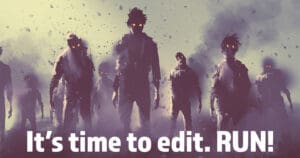LIT-450 began in January 2021, a couple of months short of year into the pandemic. Everyone was frustrated. Everyone was tired and scared to one degree or another. I turned 46, and I was still in my languishing period (see the intro of my recap of ENG-350 for a thorough explanation). It's hard to remember, as I write this on October 29, that I finished this course just eight months ago.
If my college education was a movie, ENG-359 would be the climax, and LIT-450 (plus the next two courses) would be the last 15 minutes of the film that tries to wrap up the loose ends (except my ending was 16 weeks long, so it was more like The Return of the King that way). If it was a novel, I would have hit the climax only to realize that there were a hundred pages to go.
I'll reiterate this in the advice section, but I strongly suggest taking this class on its own. If you can spare the time, if you're cool with possibly adding an extra term, do try to take this one by itself. It's a lot.
About LIT-450
You're going to read three novels and seven short stories in just eight weeks. Strap in.
What sets this course apart from the rest is that it's themed. I'll let the school explain directly from the syllabus:
This course uses a thematic approach [. . .] specific selections and authors vary each term according to the theme. This is an upper-level course involving close reading, analysis and writing in seminar format. Not available every semester. Writing intensive course.
LIT-450 Syllabus updated 10/24/2020, Southern New Hampshire University
Our theme was “loss of innocence,” and each of the novels and short stories ticks that box perfectly. Prospective students may have a completely different theme, so specific details of this recap may not strictly apply. The course itself, the bones of it, should be the same.
My professor was Dr. Christiana Ares-Christian, which is an amazing name rooted in mythology. She was a fantastic instructor who graded fairly and deeply engaged with the discussions. When I had questions, she had answers, and she provided them quickly.
Course Materials
Remember, this might not apply to you.
Week one began with Harper Lee's To Kill a Mockingbird. I was floored when I learned we were to read it, given that most of us read it in high school. I didn't expect to see it in a senior-level college course. The study was no deeper than what a high school curriculum would require, making its inclusion all the more confusing.
Side story: we had a student in the class who refused to read it. She said the novel is racist and simply would not read it or turn in any work related to it. She didn't (or perhaps couldn't) drop the course, but I don't know how the school handled things after her initial discussion post—naturally, I didn't ask. The related coursework amounted to about 250 points, so it seems unlikely she could have passed.
We began the second novel in week four: Russell Banks' 1995 novel Rule of the Bone. I had a bit of a hard time with this novel, and I'm not sure I would have continued after the first couple of chapters had I not been required to read it. The vibe at the top is tough to push through; plenty of bad things happen to every character, one of whom is a kid. I'm glad I stuck with it, because it's amazing. I found myself reading ahead of the discussion prompts, finishing the book weeks before the final classwork. If you find yourself put off by the first few chapters, I encourage you to keep going.
The third book is an anthology, The Scribner Anthology of Contemporary Short Fiction, second edition (2007). I found it to be inferior to the book used in two previous classes, 100 Years of the Best American Short Stories, though a few of the stories overlap.
The short story schedule was this:
- Week one: “Tony's Story” by Leslie Marmon Silko
- Week two: “Communist” by Richard Ford (previously covered in ENG-329)
- Week three: “The School” by Donald Barthelme (also covered in ENG-329)
- Week four: “Caviar” by T. C. Boyle
- Week six: “The Things They Carried” by Tim O'Brien
- Week seven: “The Rest of Her Life” by Steve Yarbrough
- Week eight: “How Far She Went” by Mary Hood
Having two stories that I'd read before really helped. I was able to concentrate on the Mockingbird reading and on the self-selected novel for the final project.
Another side note: I fucking hated “Caviar,” as did most of the students in my class. I'd like to share the first two paragraphs of my discussion post from week four with you.
I’d like to start with a question before addressing the loss of innocence prompt. “Caviar” is, to me, a story about terrible things caused by, and happening to, terrible people. Nat is a garbage human. Marie is self-absorbed. Wendy is either oblivious or malicious depending on how charitable one feels, and Doctor Ziss is, at best, a borderline scam artist.
My question is: Am I the only one who found almost no value in this story? I am legitimately surprised that it ended up in a book described as containing “the most compelling North American short stories” in its foreword.
My week four discussion introduction.
I'm not trying to poison the well by telling prospective students how much I despise the story; I just needed to get that off my chest… again. But you know what? As much as I hated “Caviar,” at least it provided for a lively discussion that week. There's a lesson to be learned from that.
The Final Project
Two novels and an anthology were required for the classwork, and an additional novel was needed for the final project. I do not recall, as I write this months later, if we were given a list to choose from, but I suspect that was the case. I chose On the Road by Jack Kerouac, and I don't think I would have come up with that on my own.
The final project isn't called a final project. Students begin work on the “Analytical Paper” and the associated “Analytical Paper: PowerPoint” in week three. That's right, it's one last hurrah for PowerPoint! Of the two parts to the project, the PowerPoint is by far the easier. Material for the presentation may be mined from the paper, requiring students to only find appropriate imagery and to brush up on their design skills.
As this is a 400-level course worth a combined 380 points, I went all-in on the scope of the project. I attempted, successfully, I think, to draw a line from the effects of World Wars I and II on the national psyche to the creation of the Beat Generation to the impact that On the Road had on the United States—all under the umbrella theme of “loss of innocence.”
The paper was a hair over eight pages long while the PowerPoint clocked in at 13 slides (two of which were citation slides). I don't have the rubric any more, but I think I remember worrying that the paper was too short. Well, I got an A on it, so if it was, it didn't hurt.
Advice for Students Registering for LIT-450 at SNHU
I said I'd reiterate it, and I will: try to take this course on its own. I hope the recap has convinced you its a good idea.
More than any other course, I think, time management will make or break you. Three novels, seven short stories, discussions about all of them, two major essays, and a final project. If you don't manage your time, you'll sink.
Get started on your final project reading in week one. Look ahead, determine what you'd like to read, and get going. You won't have an assignment related to it until week three, but don't wait.
There aren't any assignments on which you can skimp, save the discussions. Each assignment is worth 190 points, while each of the 12 discussions is worth 20 points. If you absolutely have to take a dive on something, you could skip a discussion in favor of spending time on one of the essays or your final project work.
In the End
I was tired after ENG-359. I was exhausted after LIT-450. I finally hit the wall that so many students hit near the end of their degree program. I just wanted it to be over. Well, two more classes to go, and I'd be taking them together.
Final grade: A (99.25%)







